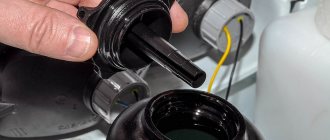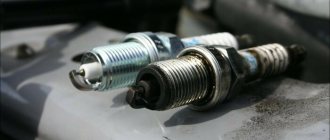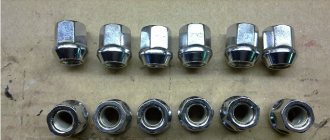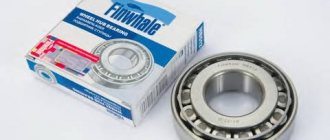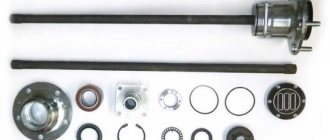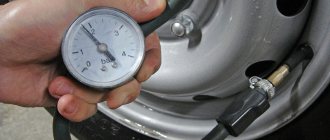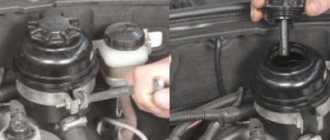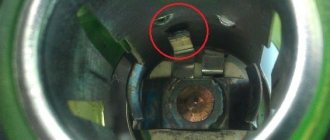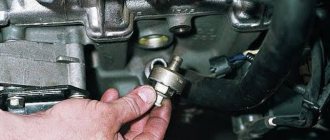Which oil for the Chevrolet Niva gearbox should you choose?
The Chevrolet Niva is an all-wheel drive vehicle. Properly selected oil for the transfer case, as well as all axles of an SUV, guarantees long-term operation of all vehicle transmission mechanisms. Oil helps reduce friction, which means the period of wear of parts increases significantly. The table below shows the characteristics of filling fluids for the Chevrolet Niva, taken from operating instructions
When choosing transmission oil for a Chevrolet Niva SUV, you should follow the recommendations of the vehicle manufacturer. It is better to purchase gear oil in special auto stores. It is best to give preference to proven, well-known brands. It is important to pay attention when buying oil for what period of the year it is intended. There are oils for summer, winter, and all seasonal. Worth remembering! If the vehicle was purchased with mileage, then it is necessary to check the oil level.
It would also be a good idea to change all the oils.
Replacing the Niva differential lock warning lamp switch
3 differentials, one in the front and rear axle gearbox, one in the transfer case. This is a mechanical device that redistributes torque to all axes depending on the force on these axes.
If the front axle is in a snowdrift and the rear axle is on ice, the two wheels that are on the ice will rotate and you will not be able to get out of the snowdrift. In order to increase cross-country ability, the differential in the transfer case is blocked, the rotational moment is transmitted to the rear and front axles in a ratio of 50 to 50. As a result, the vehicle's cross-country ability increases significantly. It cannot be used constantly. Because the torque on the axles is the same, when turning or slipping, they will rotate differently. The gearbox wires wear out. It is used when overcoming difficult sections of the road and must be turned on in advance. The differentials on the front and rear axles are not locked, only the inter-axle differential is locked. And the control lamp lights up on the instrument panel.
When I turn on the differential lock, sometimes it doesn't engage right away. You don’t need to pull with all your might, you need to start the car and drive back in first gear and a little forward about 2 meters and after that it should turn on. Because the differential locking clutch fits onto the front axle drive sprocket and at this moment the teeth on the gear may not match, so it does not turn on. Drive forward and back and then the clutch will fit. You need to turn it on with the car stopped and lock the differential and shift to a lower gear on the transfer case. Although according to your passport you can turn it off while the car is moving. I recommend doing it while the car is stopped. There will be less wear. Then this transfer case will serve for a long time!
Chevrolet Niva filling volumes
The first question before changing the oil in the Niva transmission is how much oil should be poured? The answer to this question will be a table of car refueling volumes. Here you should pay attention to the volume of oil in the gearbox housing, in the transfer case and in the rear and front axle housings. In total you will need 4.84 liters, so you can safely take a 5 liter canister of oil.
Removal
If you do the work yourself, then you need to do the following:
- Removing the wheels
- There is oil in the crankcase that needs to be drained, disconnect the driveshaft from the front axle gearbox
- We unscrew the nut and remove the bolt that secures the left gearbox bearing cover to the suspension cross member.
- We remove the existing drive from the wheel and unscrew the nuts that secure the bearing cap
- We take the steering knuckle and turn it, pulling the drive from which we disconnect the gearbox and then remove it.
We carry out the installation in the reverse order, after which we fill the lubricating fluid to the required level.
What kind of oil should I pour into the Chevrolet Niva transmission?
The choice of oil for the transmission of a Chevrolet Niva car is carried out on the principle of inadmissibility of mixing oils whose compositions are different. Regarding the viscosity characteristics of oils, it is better to give preference to the use of the following oils:
- 75w-90;
- 80w-85;
- 80w-90.
And also interesting: How to reduce Niva consumption
Oils intended for transfer case in an SUV are designated by the API GL-4 index. To replace, you will need a small amount of oil: approximately 0.8 liters. When you first fill the Niva transfer case with oil, you should remember how much oil is used. This will allow subsequent oil changes to be carried out without difficulty.
Based on the experience of auto repairmen and car enthusiasts, good transmission oil for Chevrolet Niva is produced by the following manufacturers:
- Gazpromneft: G-Box GL-4/GL-5 75W-90, G-Box GL-5 75W-90;
- Lukoil: TM-4 75w-90, TM-5 75w-90;
- Shell: Spirax S4 G 75W-90 (Getriebeoil EP), Spirax S5 ATE 75W-90 (Transaxle Oil), Spirax S6 AXME (Spirax ASX);
- Castrol: Syntrax Universal Plus 75W-90, Syntrans Transaxle 75W-90, Syntrans Multivehicle 75W-90;
- TNK: Trans KP Super 75W-90, Trans Gipoid Super 75W-90;
- ExxonMobil: Mobilube 1 SHC 75W-90
Tips for choosing oil
As mentioned above, the purpose of this car is mainly for off-road driving. This can be understood by the connection between the gearbox and all-wheel drive. The car overcomes various off-road obstacles well and withstands various operating weather conditions well. All these factors affect the performance of the transmission. To maintain transmission efficiency and reliability, lubricants must be selected responsibly.
When choosing the best transmission oil for Niva-Chevrolet, you need to follow the following recommendations. First you need to refer to the vehicle operating instructions provided by the manufacturer. Also, you should not chase the cost of oils; to a large extent, a high price does not always mean good quality. Sometimes it is influenced by the popularity of the brand - the greater its popularity, the higher the cost of the product provided. It is also important to change the oil correctly and on time, this extends the life of the transmission, and the ride itself becomes more comfortable. That is, when buying a used car, you need to take into account that it may have traveled more than one hundred kilometers. Therefore, you need to be careful when changing the oil and change it more often than on new cars. It is advisable to check the level 1-2 times a week so that it does not fall below normal - this can lead to serious deviations in the transmission.
Changing the oil in a Chevrolet Niva gearbox
To change the oil in a Chevrolet Niva gearbox, you will need the following tools:
- steel hex key 12;
- wrench 17;
- container for draining used lubricant.
The sequence of actions for changing the oil in the Niva gearbox is as follows:
- Place the car over an inspection hole or drive it onto an overpass for ease of work. Before draining the old transmission oil, it is necessary to warm up the engine . This is necessary in order to drain the oil from the box as much as possible and without residue.
- Lower yourself into the inspection hole and place a container under the drain hole, taking into account the bend of the exiting stream. It is convenient to use a funnel.
- Clean the locations of the filler and drain plugs on the gearbox, as shown in the photo above.
- First, it is better to unscrew the filler plug, and then the drain plug using a hexagon.
- Now you need to wait until all the used oil has drained to the last drop.
- The drain plug has a special magnet to which all metal shavings are attracted. If there are steel particles on the plug, they must be removed. And another important point from a diagnostic point of view - the more of these particles are present on the cover, the less the gearbox will last.
- When the old used oil is glass, you need to screw in the drain plug and start flushing the crankcase. To do this, you need to fill in about 1 liter of special flushing fluid and let the car run for 2-3 minutes. In this case, you need to turn on neutral in the transfer case and change gears with the clutch.
- Next, the flushing liquid is drained in the same way and new oil is poured in its place in the required volume.
- After filling the oil, you need to check its level on a level surface and start the engine. to let the engine run in first gear for 2-5 minutes After this, the oil level is checked and if it has dropped, then you need to add a little more.
Also interesting: Replacing the wheel bearing Niva Chevrolet: front hub and axle shaft | Niva Repair
Other fuel tanks for Chevrolet Niva
Cooling mechanism
The Chevrolet Niva has a closed-type liquid cooling mechanism.
The cooling system includes:
- radiator,
- hydraulic pump,
- indicator,
- thermostat,
- electric fan,
- expansion tank,
- pipelines, etc.
The volume of the cooling system is 8 liters.
The expansion tank is located in close proximity to the brake booster. The marked indicators make it possible to quickly respond to a lack or excess of fluid. The main importance is attached to the tightness of the cooling system. Therefore, inlet and outlet valves regulate this value.
Aluminum radiator tanks are constructed of special plastic. The coolant is supplied through the expansion tank. The parameters for this type of liquid are Antifreeze A-40 M. It is recommended to use antifreeze containing additional components to avoid rust.
Lubrication algorithm
The car has a combined lubrication system. Lubrication is carried out under pressure and is distributed to the following mechanisms:
- main bearing,
- crankshaft connecting rod,
- camshaft bearing,
- oil pump shaft,
- helical gears of the oil pump.
Selected elements are lubricated by spraying.
The oil pump, consisting of one section and having gears in its design, is driven by two gears. Oil purification is carried out using an oil filter element. Oil system pressure is monitored using a light bulb. Signaling a decrease in oil pressure in the system. The lubrication system also includes hydraulic valve stems and a torque chain tensioner.
Changing the oil in the transfer case of a Chevrolet Niva
As for this car model, the oil needs to be changed every 50-80 thousand kilometers . As soon as the car has traveled more than 120 thousand kilometers, the oil should be changed every 45 thousand kilometers. For information! The vehicle operating instructions contain information on the frequency of oil changes, which every car owner must follow. But it would be better if the oil change procedure is carried out a little more often. This is due to the fact that car oil accumulates dust and dirt, which over time leads to contamination of vehicle traffic mechanisms. This is why many car owners advise changing oils more often than indicated in the instructions. To ensure that the oil can be drained without problems, you should start replacing it after the trip. On the way, the oil has time to heat up, thereby taking on a more liquid consistency. Changing the oil in the transfer case is not as difficult as it seems at first glance. To replace it, you need to drive the vehicle into an inspection hole, or raise the car on a lift. You will need a container designed to drain the oil, as well as a rag to remove all smudges. Do not forget about the hex wrench (size 12), and you also need to have a refill syringe .
Draining and filling oil into the Chevrolet Niva transfer case
1. First of all, unscrew the drain plug. Then the oil is poured into the prepared container. 2. The old oil is checked for metal shavings. It is also worth paying attention to the built-in magnet - inspect it. 3. Impurities and dirt on the stopper should be cleaned. Afterwards the plug should be screwed back on. 4. The filler hole has a screw-on plug; it must be unscrewed. 5. Transmission oil is poured through a filling syringe. The ventilation valve is inspected and cleaned . 7. It is necessary to remember or note in a notepad the mileage that was on the car at the time of the oil change.
More details about changing the oil in the Niva transfer case are shown in the good video below.
Vibration. 3 steps to figure out the reason
- Transfer case. First of all, start it up, put the transfer case in neutral and raise the speed to 3000; if there is vibration, then this is a problem with the engine, the cushion has sagged.
- Started, there is no vibration, eat, there is vibration. This is the intermediate shaft that connects the transmission to the transfer case. There is an elastic coupling on it and there may be some wear on it. The bolts on the clutch are loose or the transmission and transfer case are simply incompatible. We start the car, put the transfer case downshift and upshift lever in neutral, and turn on fourth or fifth speed, depending on the gearbox. We add gas to 1500 rpm, vibration begins. On the transfer case there are 2 pillows and 4 nuts, which are screwed onto 4 studs. We release so that the transfer case wobbles, after which we start the car, turn the transfer case lever to neutral and raise the speed to 3,000, hold it for 10-20 seconds and smoothly lower the speed and tighten the transfer case.
- The most common option for 99% of variations is the splines on the driveshaft wearing out. To begin, shake the driveshaft on the splines by hand. There is a knocking sound as the driveshaft runs up on the splines. How to determine that it is a driveshaft. If you have a lift, we start driving, accelerate the car at a speed at which there is vibration and it is stable and turn on neutral gear; if it is a driveshaft, then the car will shake. We replace it with a new one and all the vibrations go away. It's rare for the front driveshaft to vibrate, but it's very, very rare.
Changing the oil in the axles of a Chevrolet Niva SUV
For this procedure, it is recommended to follow vehicle maintenance, as well as the rules for repairing an SUV. Oil changes in vehicle axles should occur every 40 thousand kilometers (applies to cases of Niva operation under normal conditions ). If the car is operated in more difficult conditions, then the oil should be changed much earlier.
Preparation for changing the oil in Chevrolet Niva axles
Changing the oil in a vehicle's axles is identical to the procedure for changing the fluid in the transfer case. You should drive the SUV onto a viewing hole or onto a lift. The volume of oil required is the same as for the transmission. Before changing the oil, you should warm up the Niva. Next, you will need a 12-mm hex key, a 17-mm socket with a knob, a container for draining the used oil, and a rag. You should also make sure you have a refill syringe.
Stages of oil change in Chevrolet Niva axles
1. Unscrew the drain plug. 2. The bolt magnet is inspected to determine whether there are chips on it. If there are no chips, the bolt is screwed back in. 3. The used oil is drained into a prepared container. 4. The drain plug is screwed on and tightened - this procedure applies to the rear axle. 5. The filler plug is unscrewed. 6. Using a filling syringe , add oil in the required volume. 7. The filler plug is screwed in and tightened - again we are talking about the rear axle.
Changing the oil in the front axle of a Chevrolet Niva is shown in more detail in the video.
For details on changing the oil in the rear axle of a Chevrolet Niva, watch the video.
even an inexperienced driver can change the oil in Niva on his own if he follows all the necessary recommendations and the above. If you have any questions about changing the oil in the Niva transmission, ask them in the comments - our specialists will answer them.
Preparing for replacement
The process of changing the lubricant yourself will take a little time - an hour or an hour and a half. But you need to prepare first. A set of tools, devices, and consumables is selected. You will need a 12mm hex key and a 17mm socket head, a container for waste fluid, dry rags, and sealant. For filling, you can use a special filling syringe (pump) or another device (funnel with hose). Copper sealing rings are placed on the crankcase plugs. Therefore, you need to prepare them in advance. Work is carried out with protective gloves.
Lubrication
On previous versions, drivers encountered problems with the lever's operation. It was possible to accidentally engage reverse gear instead of fifth. This issue has now been fixed. The solution was found in the form of installing a blocker, which is located at the end of the traction fork.
Now, to engage reverse gear, you need to squeeze the clutch and only then move the lever to position R. In this case, the locking stop drops below the special lining. In order for the mechanism to work properly inside, when the speed is turned on, constant lubrication occurs due to the splashing of oil. Therefore, to prevent oil leakage from the transfer case and dirt and dust not to get inside, the landing spots of the primary and secondary shafts are sealed with oil seals.
Gear shift mechanism
This component consists mainly of a plate with cutouts that are rectangular in shape. All this is enclosed in the main body and is controlled by a lever.
The speed control mechanism is mounted on studs at the rear of the box. The neutral position is located between the third and fourth speeds and is adjusted by bars with spring guides. The plates are located in the guides to provide mechanical movement of the lower part of the lever.
The drive is based on three rods that connect to forks. Forward gears are engaged as a result of the forks entering special holes in the couplings. The rear entry is activated when the fork enters a special hole.
